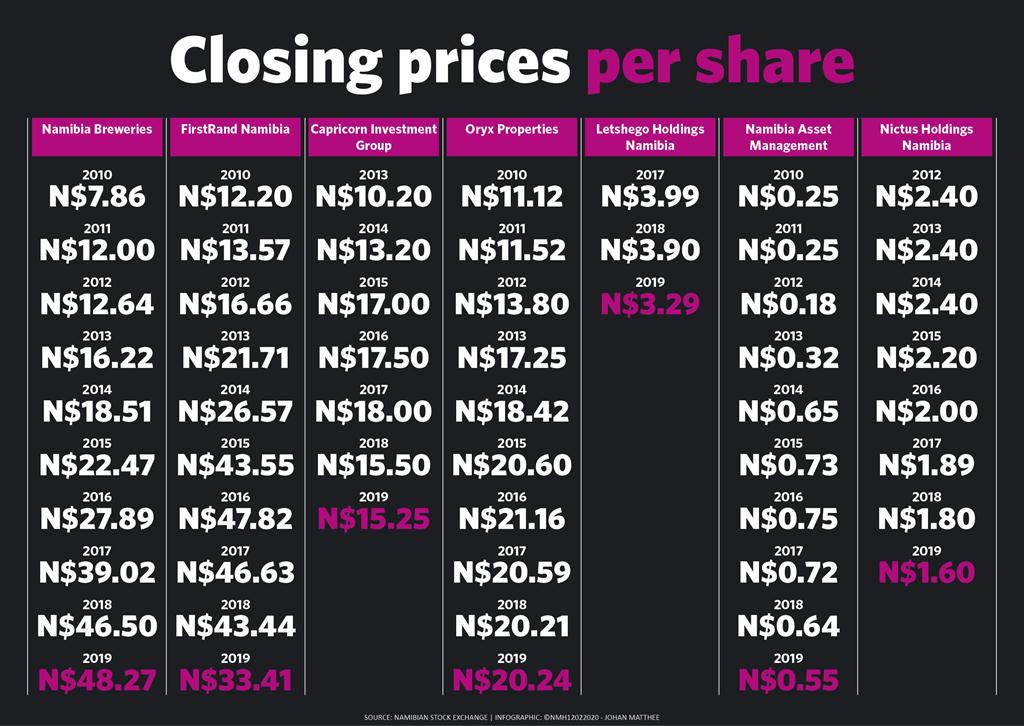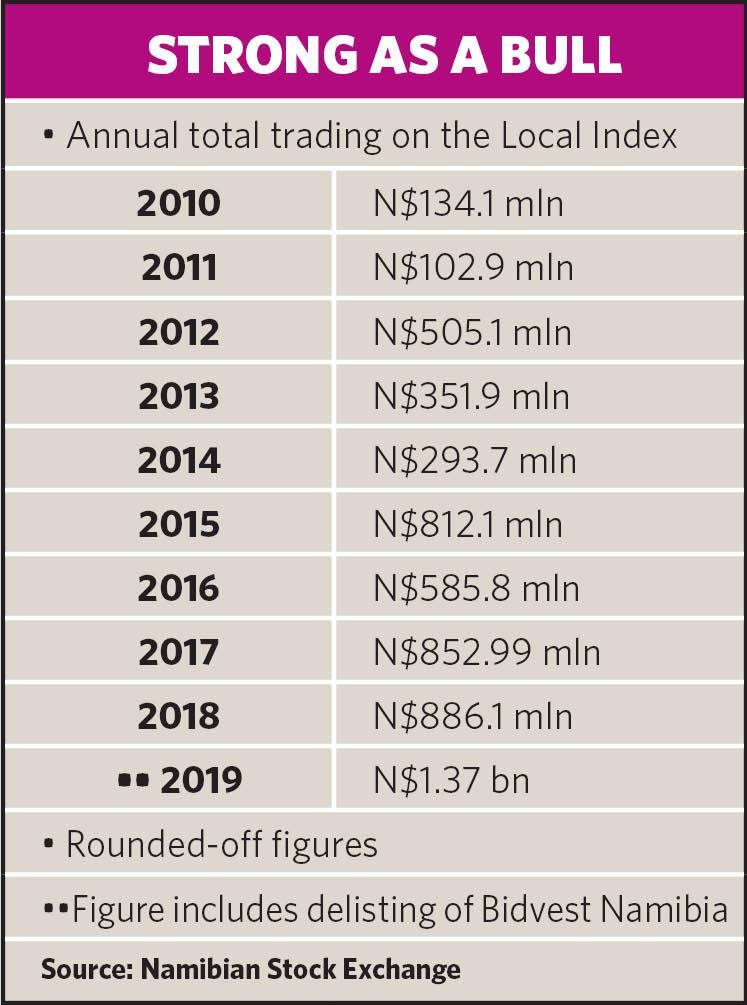NSX bears brunt of recession
Actual trading on the Local Index of the NSX last year dropped by about 30% compared to 2018.
Jo-Maré Duddy – The recession didn’t spare the Namibian Stock Exchange (NSX) last year: Trading volumes dropped and the share prices of most of the companies listed on the Local Index ended 2019 lower than 2018.
“2019 was a difficult year in macro-economic terms and could be seen in lower trading volumes in the exchange as well as lower stock prices. The Local Index went down by 1.2%,” said the chief executive officer of the NSX, Tiaan Bazuin.
On paper, trading on the Local Index nearly came in at whopping N$1.4 billion. However, Bidvest Namibia delisted in June, shaving more than N$756 million off the figure.
That leaves total trading on the Local Index in 2019 at nearly N$616.7 million, about N$269.4 million or 30.4% less than in 2018.
The Local Index has come a long way in the last decade: In 2010, total trading was around N$134.1 million. Nearly 16.8 million shares changed hands, compared to 92.1 million last year.
At the end of 2010, seven companies were listed on the Local Index. In the meantime, Bidvest Namibia delisted, while Trustco Group Holdings became a dual-listed company on the Overall Index of the NSX.
At the end of last year, the Local Index boasted ten companies, including Paratus Namibia Holdings – which listed in 2017 as the first capital pool company (CPC) on the NSX – and preferential shares of Stimulus Investments.
Ten years ago, the market capitalisation of the Local Index in terms of total shares in issue was N$7.782 billion. Market capitalisation by free float was N$3.524 billion. These figures rose to N$36.339 billion and N$13.223 billion respectively by the end of 2019.
The Local Index ended 2010 at 172.72 points. It closed 31 December 2019 at 613.87 points.
Tough year
Excluding Bidvest Namibia, the bulk of trading on the Local Index in 2019 belonged to Namibia Breweries. About N$374.7 million of the company’s shares changed hands.
FirstRand Namibia clinched deals worth nearly N$117.2 million, followed by Capricorn Investment Group with some N$93.7 million.
Total trading of the other companies on the Local Index was: Oryx Properties (N$18.3 million); Stimulus (N$6.9 million); Letshego Holdings Namibia (N$2.8 million); Paratus Namibia Holdings (N$2.28 million); SBN Holdings (N$341 083); Namibia Asset Management (N$330 904); and Nictus Holdings Nam (N$27 280).
The biggest winner on the Local Index last year was Stimulus. The group ended the year at N$127.90 per preferential share, up 5.4% from 2018.
NamBrew closed the year at N$48.27 per share, up 3.8%. Oryx Properties ended 2019 0.1% higher at N$20.24 a piece.
The biggest loser on the Local Index last year was FirstRand Namibia. Its closing price of N$33.41 was 23.1% lower than the end of 2018.
Other companies on the Local Index which shed value were: Letshego Holdings Namibia (-15.6%); Namibia Asset Management (-14.1%); Nictus Holdings – Nam (-11.1%); Paratus Namibia (-6.5%); and Capricorn (-1.6%).
Highlights
Bazuin described the listing of Standard Bank Namibia (SBN) in November as one of the highlights of the NSX’s year.
The group “raised a significant amount of capital with a large amount of retail investors taking part in the IPO [initial public offer]”. “That’s a positive sign as to more people taking part in the market,” Bazuin said.
A total of 12 524 prospective investors applied for 160 655 728 SBN shares in total, resulting in an oversubscription of 1.98 times.
SBN’s listing was the biggest on the Local Index since Bank Windhoek Holdings – nowadays Capricorn Investment Group – listed in June 2013.
Bazuin described the listing of Anirep in September as another milestone.
Alpha Namibia Industries Renewable Power Ltd (Anirep) became the first alternative electricity company and the second CPC to list on the NSX.
Anirep listed on the Development Capital Board of the NSX after raising more than N$110 million from institutional and retail investors via a private placement process.
Outlook
MTC is expected to be the first state-owned enterprise (SOE) to list on the NSX. The opening date for the company’s IPO has been set for next month and the listing is expected in July this year.
Bazuin said the NSX is also working on ways to further develop the market, as well as amendments to CPC rules to make it easier to list and to reverse list companies as was the case with Paratus Namibia joining the NSX Main Board.
One of the issues hampering the growth of the NSX is the fact that it is not conducting business electronically yet.
“We need to move away from certificates and go electronic. The NSX already signed with a vendor to set up the Central Securities Depository, but we are not allowed to start operations as the regulator requires FIM [Financial Institutions and Markets] to be passed to issue a license for the CSD.
“Many potential investors are not willing to take part in a market that is not dematerialised. This is a big hampering factor in the bond market,” Bazuin said.
“2019 was a difficult year in macro-economic terms and could be seen in lower trading volumes in the exchange as well as lower stock prices. The Local Index went down by 1.2%,” said the chief executive officer of the NSX, Tiaan Bazuin.
On paper, trading on the Local Index nearly came in at whopping N$1.4 billion. However, Bidvest Namibia delisted in June, shaving more than N$756 million off the figure.
That leaves total trading on the Local Index in 2019 at nearly N$616.7 million, about N$269.4 million or 30.4% less than in 2018.
The Local Index has come a long way in the last decade: In 2010, total trading was around N$134.1 million. Nearly 16.8 million shares changed hands, compared to 92.1 million last year.
At the end of 2010, seven companies were listed on the Local Index. In the meantime, Bidvest Namibia delisted, while Trustco Group Holdings became a dual-listed company on the Overall Index of the NSX.
At the end of last year, the Local Index boasted ten companies, including Paratus Namibia Holdings – which listed in 2017 as the first capital pool company (CPC) on the NSX – and preferential shares of Stimulus Investments.
Ten years ago, the market capitalisation of the Local Index in terms of total shares in issue was N$7.782 billion. Market capitalisation by free float was N$3.524 billion. These figures rose to N$36.339 billion and N$13.223 billion respectively by the end of 2019.
The Local Index ended 2010 at 172.72 points. It closed 31 December 2019 at 613.87 points.
Tough year
Excluding Bidvest Namibia, the bulk of trading on the Local Index in 2019 belonged to Namibia Breweries. About N$374.7 million of the company’s shares changed hands.
FirstRand Namibia clinched deals worth nearly N$117.2 million, followed by Capricorn Investment Group with some N$93.7 million.
Total trading of the other companies on the Local Index was: Oryx Properties (N$18.3 million); Stimulus (N$6.9 million); Letshego Holdings Namibia (N$2.8 million); Paratus Namibia Holdings (N$2.28 million); SBN Holdings (N$341 083); Namibia Asset Management (N$330 904); and Nictus Holdings Nam (N$27 280).
The biggest winner on the Local Index last year was Stimulus. The group ended the year at N$127.90 per preferential share, up 5.4% from 2018.
NamBrew closed the year at N$48.27 per share, up 3.8%. Oryx Properties ended 2019 0.1% higher at N$20.24 a piece.
The biggest loser on the Local Index last year was FirstRand Namibia. Its closing price of N$33.41 was 23.1% lower than the end of 2018.
Other companies on the Local Index which shed value were: Letshego Holdings Namibia (-15.6%); Namibia Asset Management (-14.1%); Nictus Holdings – Nam (-11.1%); Paratus Namibia (-6.5%); and Capricorn (-1.6%).
Highlights
Bazuin described the listing of Standard Bank Namibia (SBN) in November as one of the highlights of the NSX’s year.
The group “raised a significant amount of capital with a large amount of retail investors taking part in the IPO [initial public offer]”. “That’s a positive sign as to more people taking part in the market,” Bazuin said.
A total of 12 524 prospective investors applied for 160 655 728 SBN shares in total, resulting in an oversubscription of 1.98 times.
SBN’s listing was the biggest on the Local Index since Bank Windhoek Holdings – nowadays Capricorn Investment Group – listed in June 2013.
Bazuin described the listing of Anirep in September as another milestone.
Alpha Namibia Industries Renewable Power Ltd (Anirep) became the first alternative electricity company and the second CPC to list on the NSX.
Anirep listed on the Development Capital Board of the NSX after raising more than N$110 million from institutional and retail investors via a private placement process.
Outlook
MTC is expected to be the first state-owned enterprise (SOE) to list on the NSX. The opening date for the company’s IPO has been set for next month and the listing is expected in July this year.
Bazuin said the NSX is also working on ways to further develop the market, as well as amendments to CPC rules to make it easier to list and to reverse list companies as was the case with Paratus Namibia joining the NSX Main Board.
One of the issues hampering the growth of the NSX is the fact that it is not conducting business electronically yet.
“We need to move away from certificates and go electronic. The NSX already signed with a vendor to set up the Central Securities Depository, but we are not allowed to start operations as the regulator requires FIM [Financial Institutions and Markets] to be passed to issue a license for the CSD.
“Many potential investors are not willing to take part in a market that is not dematerialised. This is a big hampering factor in the bond market,” Bazuin said.








Kommentar
Allgemeine Zeitung
Zu diesem Artikel wurden keine Kommentare hinterlassen